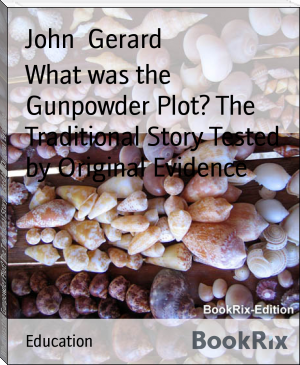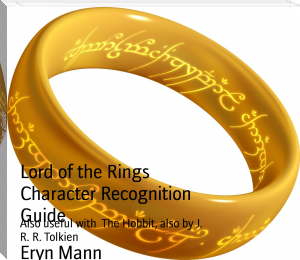What was the Gunpowder Plot? The Traditional Story Tested by Original Evidence - John Gerard (interesting novels in english txt) 📗

- Author: John Gerard
Book online «What was the Gunpowder Plot? The Traditional Story Tested by Original Evidence - John Gerard (interesting novels in english txt) 📗». Author John Gerard
James, John, a supposed Dominican, 139 note, 258.
Jardine, David, on the character of the official narrative, 129, 163; on the falsification of evidence, 199; on the Monteagle letter, 117; on the king's interpretation, 132 note; on the established facts of the case, 12; not perfectly impartial, 161, 207; on the results of the Plot, 213.
Jessopp, Augustus, D.D., on the value of money, 36 note, 117 note; on Father Gerard's innocence, 207.
Jesuits, efforts to incriminate, 177 note; Cecil on their "insolencies," 106.
Kennet, White, Bishop of Peterborough, 45 note, 46, 263.
Keyes, Robert, contradictions respecting him, 84 note, 183. See also Conspirators.
"King's Book," the, its character, 108; Cecil's description of it, 219, 220.
Knyvet, or Knevet, Sir Thomas, leads the party which captures Faukes, 124 seq.; receives a peerage, 139 note; the Countess of Suffolk his sister, 224 note.
Lake, Sir Thomas, 19, 232.
Lenthal, William, Speaker of the Long Parliament, his evidence reported, 160.
Lindsay, Sir James, conveys messages between King James and Pope Clement VIII., 104.
Lingard, John, D.D., 68 note, 231.
Littleton, Humphrey, 167 note.
Littleton, Stephen, 2, 4, 156.
Lodge, Edmund, F.S.A. (Illustrations of British History), 98.
Lopez' Plot, 14.
"Main," the, 15 note, 26, 216.
Mar, Earl of (John Erskine), 168 note, 172, 266.
Mary, Princess, daughter of James I., 81, 176.
Milton, poems on the Plot, 226.
Mine, the, story told respecting it, 63 seq.; difficulties respecting it, 84 seq.
Mischeefe's Mystery, 72, 115, 121, 123, 153 note, 159.
Money, value of, 36 note, 117 note; amount raised by conspirators, 39.
Monteagle, Lord (William Parker), his character and antecedents, 118; relations with the king and court, 34, 119; letter to the king, 119, 256; connection with the conspirators, 118; communicates the warning letter to Cecil, 120-123, 160; attends parliament on the day of the "discovery," 137 note; devices of the government on his behalf, 116; rewards conferred, 116; subsequent conduct, 258.
Moore, Sir Francis, his evidence reported, 151.
Moore, Sir Jonas, 138.
More, Father Henry, S.J., 49.
Morgan, Harry, 81 note.
Morgan, Thomas, 157 note, 193 note.
Naunton, Sir Robert, on Cecil's character, 19.
Northampton, Earl of (Henry Howard), a nominal Catholic promoted by King James, 29; Cecil's agent in his secret correspondence, 26 note; on Cecil's death, 23; on the history of the "cellar," 58 note; not admitted to all Cecil's secrets, 112.
Northumberland, Earl of (Henry Percy), a rival of Cecil's, 26; who secretly traduces him, 26 note, 215, 216; the Plot turned to his ruin, 26, 107, 216-218; which is attributed to Cecil, 26 note, 218, his sentiments in return, 218.
Nottingham, Earl of, Lord Admiral (Charles Howard), 170 note, 265.
Oates, Titus, 46, 138.
Oath taken by the conspirators, 9.
Oldcorne, alias Hall, Father Edward, S.J., captured along with Garnet, 7; never accused of complicity ib.; Catholic demonstration at his execution, 28 note; tortured, 173.
Oldmixon (Royal House of Stuart), 25 note, 46.
Osborne, Francis, on Cecil's unpopularity, 25; on the "discovery," 44; on the 5th of August celebration, 232 note; on Northumberland and Cecil, 218; his qualifications as an historian, 44.
Owen, Captain Hugh, falsely described as a Jesuit, 173 note, 185 note; particularly obnoxious to the government, 173, 185; evidence fabricated against him, 174; Cecil's instruction respecting him, 116 note; efforts made to secure him, 185 seq.; his intercourse with Phelippes, 112, 185 note.
Owen, Lewis, 263.
Paris, Henry, 162.
Parliament, its successive adjournments, 67, 70 note, 91, 114, 230; meets on the day of the "discovery," 136; activity against Catholics, 5, 212 seq.
Parry, Sir Thomas, English Ambassador at Paris, instructions given to, 28 note; intelligence supplied by, 98, 101, 102; account of the discovery furnished to, 126 seq.
Parry, Dr. William, his Plot, 14, 153.
Parsons, Father Robert, S.J., letters to, 29 note, 77, 223; his views as to the succession, 249; on Walsingham's "spyery," 77.
Percy, Sir Charles, 192 note.
Percy, Thomas, one of the first and principal conspirators, 9, 64; his antecedents, 36, 37, 148; house hired by him, 60; and "cellar," 75; strange conduct in both transactions, 88; conduct afterwards, 88, 91; undertakes to seize Duke Charles or Princess Elizabeth, 82; his death, 4, 152 seq; profession of religious zeal, 148; bigamy, ibid; Catholics suspicious of him, 150; alleged secret dealings with Cecil, 151; the case against him, 148-156. See also Conspirators.
Phelippes, Thomas, the "decipherer," employed by the government, 111; their devices against him, 112; correspondence with Hugh Owen, 185 note.
Pickering, Mr., and his horse, 261. Plain and Rational Account of the Catholick Faith, 49.
Plots under Elizabeth and James I., 14, 15, 153, 157 note, 193 note; their common feature, 13.
Polititian's Catechism, 51 note, 106, 137 note.
Pope Clement VIII., interchanges communications with James I., 104.
Pope Paul V., represented as an accomplice in the Plot, 5, 239.
Popham, Sir John, Lord Chief Justice, 170 note, 197, 266.
Raleigh, Sir Walter, Cecil's enmity towards him, 26 note, 48 note, 198; his ruin, 26, 216; attempt to implicate him in the Powder Plot, 197, 198.
Ratcliffe, Ralph, a government spy, 95, 96, 191.
Rich, Sir Edwin, 264.
Richardot, President, 189.
Rogers, Professor Thorold, on the value of money, 117 note; on James's title to the throne, 34.
Rokewood, Ambrose, 179 note. See also Conspirators.
Salisbury, first Earl of. See Cecil, Robert.
Salisbury, second Earl of. See Cecil, William.
Sanderson, Sir William, 46.
Schondonck, Father Giles, S. J., Rector of St. Omers, on the innocence of the Jesuits, 201; on Cecil's manifesto, 222.
Scott, Sir Walter, 132 note.
Shakespeare, never alludes to the Plot, 226 note.
Sharpe, Dr. R. R., 262 note.
Shepherd, John, evidence of, 251.
Smith, John Thomas (Antiquities of Westminster), 58 note, 79 note, 89 note.
Soane, Sir John, 238.
Southwaick, or Southwell, a government spy, 99-102.
Speed, John (Historie), 62, 63 note.
Squires, Edward, his plot, 14.
Stanley, Sir William, 185, 192 note.
Strange, Father Thomas, S. J., 96 note.
Streete, John, pensioned for killing Percy and Catesby, 155.
Strype, John (Annals), 28 note.
Suffolk, Earl of, Lord Chamberlain (Thomas Howard), his venality, 224.
Talbot, John, of Grafton, 38 note.
Talbot, Peter, Archbishop of Dublin. See Polititian's Catechism.
Theobald, Lewis, 267.
Topcliffe, Richard, priest-hunter, 202.
Torture, use of, 4, 5, 172, 173, 201 note, 259, 260.
Tresham, Francis, enlisted in the enterprise, 10, 252 seq.; his previous record, 35, 36; his action on behalf of King James, 34; suspected of writing the warning letter, 147, 158; and of collusion with Cecil, ibid.; his conduct after the "discovery," 3, 158; his death in the Tower, 6 note, 158. See also Conspirators.
Tresham, Sir Thomas, proclaims King James, 34; summoned to Court, 248.
True and Perfect Relation, character of the narrative, 43, 163.
Tytler, Patrick Fraser, 112.
Usher, James, Archbishop of Armagh, his evidence reported, 45.
Venatio Catholica, 261.
Vetusta Monumenta, 79, 86.
Villeroy, M., on Cecil's duplicity, 23.
"Vinegar House," 60 note.
Vowell, Peter, evidence reported, 160.
Waad, Sir William, lieutenant of the Tower, charged by Cobham with forgery of evidence, 202; dismissed from his post, 203 note, 267; his inscriptions in the Tower, 264, 267; letters to Cecil, 168, 258.
Walsh, Sir Richard, sheriff of Worcestershire, 4, 154 note.
Ward, Samuel, preacher and artist, 239.
Webb, John, evidence reported, 160.
Weldon, Sir Anthony, on Cecil's unpopularity, 25.
Welwood, James (Memoirs), 46.
Westmoreland, titular Earl of (Henry Neville), attempt to implicate him, 197.
Whynniard, Mr., landlord of Percy's house, 61 note, 89; his sudden death, 92 note.
Whynniard, Mrs., evidence of, 61, 67, 72, 88, 142.
Willaston, William, intelligence supplied by, 99.
Wimbledon, Viscount (Edward Cecil), his evidence reported, 160.
Windsor, Lord, his house plundered by the conspirators, 2.
Winter, Robert, introduced to the conspiracy, 10; captured at Hagley, 4; evidences of foul play in his regard, 183, 184; trial and execution, 6. See also Conspirators.
Winter, Thomas, one of the first conspirators, 9, 64; character, 35; Spanish mission, 36, 118; brings Faukes from Flanders, 9; attends the prorogation, Oct. 3rd, 74 note, 230; captured at Holbeche, 4; his published confession, 167 seq.; probably tortured, 169; trial and execution, 6. See also Conspirators.
Wood, Anthony à, notes addressed to, 159.
Worcester, Earl of (Edward Somerset), 168 note, 266.
Wotton, Sir Henry, 160.
Wren, Sir Christopher, 138.
Wright, Christopher, his introduction to the Conspiracy, 9, 64; character, 35, 37; previous employment in Spain, 36; killed at Holbeche, 4, 152. See also Conspirators.
Wright, Henry, his informations, 94, 95, 254.
Wright, John, one of the first conspirators, 9, 64; character, 35, 37; killed at Holbeche, 4, 152. See also Conspirators.
CHISWICK PRESS:--CHARLES WHITTINGHAM AND CO. TOOKS COURT, CHANCERY LANE, LONDON.
TRANSCRIBERS' NOTES:
p 14: there is no closing quotation mark following the line '"making and fomenting plots was then in fashion; nor can it be denied that good grounds for such an opinion were not lacking.' The closing mark is placed at the end of this sentence, though this may be incorrect.
p 20: continuation of footnote 37 from previous page begins with 'avor'; this is a typo for 'favor'.
p 24: 'the' repeated in footnote 49, epigram 2; one 'the' removed.
p 32: added a closing quotation mark following 'and prepared for them'.
p 36: added . to end of footnote 87, after 'The Spanish Treason'.
p 49: Inserted , into footnote 124; 'James I., lxxxi.'.
p 120: footnote 257: missing closing bracket; corrected.
p 154: inserted , into footnote 310; 'James I., i. 588'.
p 160: changed ' to " to match quote mark style, footnote 329.
p 194: footnote 396: 'Englands' changed to 'England's'.
p 248: added missing full-stop: 'give ease to Catholics'.
p 255: added opening double-quote marks to the passage entitled 'Application to the King.'
p 266: the oe ligature was represented as [oe]
p 268, 269: uncommon 'inverted asterism' topographic marks are used to signify important notes on conventions used in the text; they have the form of three asterixes arranged in a v-shape. For simplicity, they are replaced with '***' in this document.
p 281: 'incrediblty' changed to 'incredibility', 'o' changed to 'of'.
ImprintPublication Date: 11-06-2014
All Rights Reserved





Comments (0)